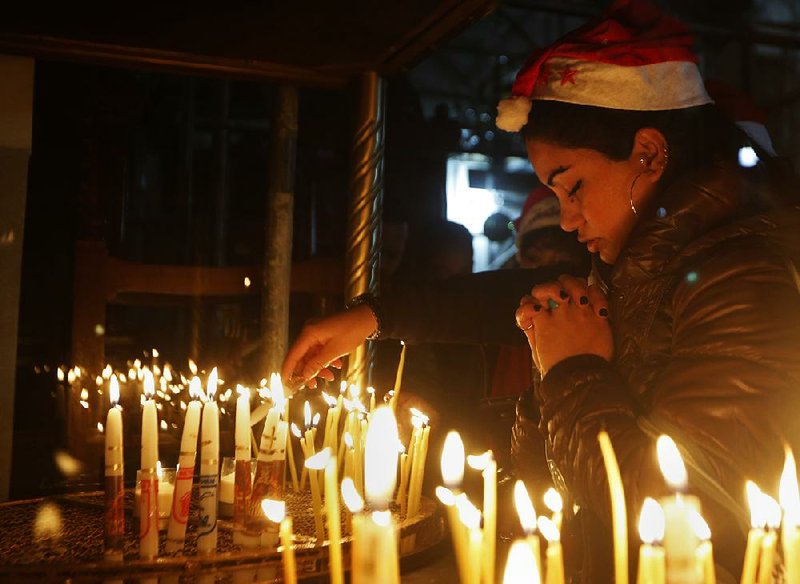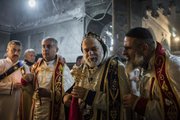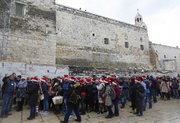BETHLEHEM, West Bank -- Thousands of pilgrims and tourists from around the world together with local Christians gathered in the biblical town of Bethlehem to celebrate Christmas Eve in the traditional birthplace of Jesus, with spirits lifted by a slowdown in recent violence and by cool, clear weather.
Security was tight in Bethlehem after recent deadly attacks on Christian targets in neighboring Egypt and Jordan by Islamic extremists.
Yet the faithful braved the chilly weather outside the town's Manger Square as traditional Christmas songs like "Jingle Bells" played in Arabic over loudspeakers and as Scout groups paraded with bagpipes and sang carols. Elated tourists and local Christians alike wandered around the square illuminated by festive red and golden lights and a Christmas tree, visiting souvenir shops and restaurants.
Sharolyn Knight, a 28-year-old teacher from Georgia, said she was in Bethlehem for the first time and experiencing mixed emotions. "It's been sobering and humbling because it's a place with a lot of heavy stuff, religious and historical. At the same time, disillusioning because there is so much strife in the place where Jesus was born."
She said she would return, maybe next time with her kids.
"It's very unique, I've never seen anything like it," said Rodrigo Reis, 23, who came from Louisville, Ky. "It's very meaningful, it's Christmastime, where everything started."
Christian clergymen welcomed the top Roman Catholic cleric in the Holy Land inside the Church of Nativity in Bethlehem, the biblical birthplace of Jesus Christ, as Christians worldwide prepared to celebrate Christmas.
The Rev. Pierbattista Pizzaballa, the apostolic administrator of the Latin Patriarchate, is the temporary chief clergyman to the local Catholic population. He traveled from Jerusalem to Bethlehem on Saturday in a traditional procession. Later, he was to celebrate midnight Mass at the Church of the Nativity, built at the grotto revered as Jesus' birthplace.
"I wish this joyous atmosphere of Christmas will continue in the year and not just for a few days, and I hope the coming year will bring a little more serenity and peaceful relations in our country. We need it," he said.
"I am happy that the war, at least the military war, in Aleppo is finished and that for the first time in Aleppo the Christians can celebrate without fear the Christmas season. I wish that they can now reconstruct, rebuild the city, not only the infrastructure but also the common relations that was a tradition over there," he told The Associated Press.
The Syrian government assumed full control of Aleppo earlier this month when rebels, including some Islamic militants, agreed to withdraw from their last remaining enclave after more than four years of heavy fighting over the country's largest city.
Christmas festivities brought a boost of holiday cheer to Christians in the Holy Land, who make up just a small percentage of the population. The region has experienced a wave of Israeli-Palestinian bloodshed that began over a year ago. The violence has tapered off in recent months but has not halted completely.
Some in the region were also celebrating the passage of a U.N. Security Council resolution condemning Israeli settlements in the occupied West Bank.
Julie Suhain, 20, from Ramallah said she was delighted with the resolution.
"It's like getting a Christmas gift," she said. "We've been waiting for this for a long time."
Iraqi Christians despair
About 600 miles away in Iraq, the Ankawa camp in Irbil is home to thousands of Iraqi Christians displaced by the Islamic State extremist group in 2014.
The children and young adults are celebrating Christmas. But for many others, the holiday spirit is tinged with homesickness and despair.
"I just want to go home," said a tearful 79-year-old Victoria Behman Akouma. She was among a handful who briefly stayed behind after the Islamic State seized her town of Karamlis in August 2014. "They asked me to convert to Islam, but I told them I will die a Christian and that they can kill me if they want to," she said.
After Akouma spent 11 days under Islamic State rule, militants escorted her to the border of the Kurdish region in northern Iraq.
The Christians of Iraq's Nineveh province, of which Mosul is the capital, were once members of an ancient but still vibrant Christian community in Iraq. They enjoyed protection and near equal rights with Iraq's Muslim majority under Saddam Hussein, but their numbers rapidly dwindled after the U.S.-led invasion of Iraq toppled his regime in 2003. Of the estimated 1.5 million Christians who lived in Iraq on the eve of the U.S.-led invasion, about 500,000 are left.
The Sunni militants frequently attacked Christians and churches, terrorizing the community and forcing many to flee abroad, some to the West, some to the Kurdish region where tolerance for members of religious minority groups is much greater than in the rest of Iraq. With so much of their territory destroyed, the Christians are stuck in camps for the foreseeable future, relying on government handouts, assistance from aid organizations and the church's benevolence.
The Islamic State group's onslaught across northern Iraq in 2014 devastated the unique communities in Christian-majority town like Karamlis, Bartella and Qaraqosh -- all in the Nineveh plains.
Raheel Georgis is another elderly woman who refused to leave with the rest of her town in 2014, preferring to stay home. After living for three months under Islamic State rule, the militants placed her at an old people's home in Mosul. Later, they took her before a Sharia court and gave her the choice of converting to Islam or paying a special tax for non-Muslims.
She rejected both options and, as a result, was dumped on the border with the Kurdish region from where she was taken to Irbil.
"I humored them the whole time," the 72-year-old Georgis said of the Islamic State militants. "But I refused to be a Muslim."
Christmas Eve Mass
The Iraqi offensive launched in October to retake Mosul has recaptured most Christian areas. But so far, the Christians have only gone back for visits, to see homes or attend services in churches that were not as badly damaged.
The Assyrian Orthodox Church of Mart Shmoni was deemed safe enough for a lunchtime Mass on Christmas Eve for about 300 Christians bused in from Irbil. Lunchtime was chosen in part because most of the church's light fixtures are gone, and exposed wiring hangs from the ceiling. The church is still missing its icons, and a headless statue of a late patriarch stands in the front yard.
On Saturday, women joyously ululated when they stepped into the marble-walled church. Almost everyone held a lit candle. Many took photos with their cellphones. A handful of gas heaters were brought in, but they did little to warm the place on a wet and windy December day.
For many of them, the sight of their hometown in almost complete ruin was shocking. Only a few homes in the once-vibrant town of some 25,000 people stand unscathed. Most have been damaged by shelling or blackened by fire.
Halfway through the service, conducted in Assyrian and Arabic, roughly a dozen U.S. military servicemen and a 100-man contingent from the Iraqi military led by several top generals descended on the church in a show of solidarity.
Unlike their American counterparts, the Iraqi troops came armed. Iraqi soldiers searched people coming into the church. Inside, soldiers frisked anyone moving close to the Iraqi generals, who arrived in some two dozen armored SUVs and Humvees.
The soldiers photographed one another and took selfies. Many of them held candles, and the congregation warmly applauded when Bishop Mussa Al-Shamani thanked the Iraqi military for "liberating" Bartella.
On one street wall, the Islamic State's black banner remains visible under the white paint. Next to it, someone wrote: "Christ is the light of the world. Bartella is Christian."
"Our joy is bigger than our sadness," said university student Nevine Ibrahim, 20, who was in Bartella on Saturday for the first time since she, her parents and four siblings left in 2014. They found their house badly damaged. Everything they owned was gone.
"I don't think we can return. The house can be fixed, but the pain inside us cannot," she said, seated among three of her siblings. "Who will protect us?"
Information for this article was contributed by Hamza Hendawi and staff members of The Associated Press.
A Section on 12/25/2016


